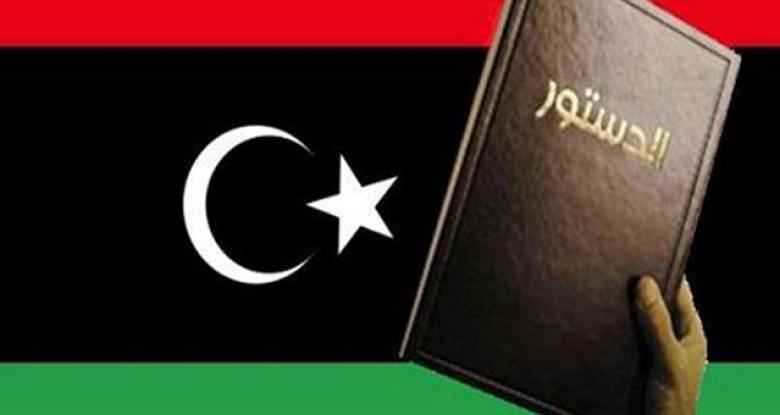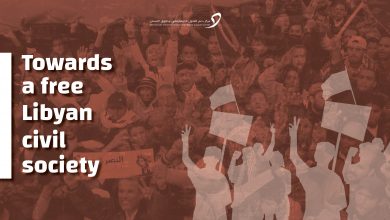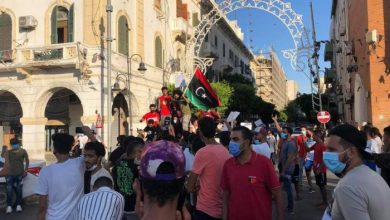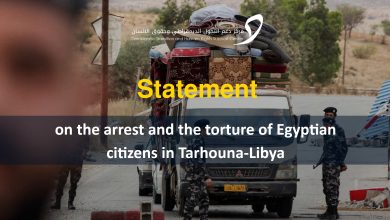
In the framework of the policy and legislative reform program of the Democratic Transition and Human Rights Support Center (DAAM), the Center provides the constituent body in charge of drafting the Libyan constitution within these comments on the draft constitution and that was sent to him for that purpose.
The Center (DAAM) presents its sincere thanks and appreciation to the entire members of the Commission and its quality committees, headed by Dr. Ali Tarhouni for continuing to work in such a bloody atmosphere and difficult times in order to exit the looked forward the Libyan state constitution.
DAAM asserts that whatever the observations we present on of the draft of the Libyan Constitution are as the non-realization of values and principles that had to be represented by a constitution achieving the modern civil state principles, based on the principles of sovereignty of the people and the achievement of the rule of law, via the principle of separation of powers and the full independence of the institutions and guarantee the civil and political rights and economic and social rights and non-discrimination between citizens on the basis of religion, gender, color, we still should insist on the capacity of the different components of the Libyan people to draft a constitution with a minimum level of consensus, after an authoritarian and bloody rule followed by a transition period marred by violence, remains an achievement we should stick with it and build upon the initial recommendation which is the tentative to amend the constitution in line with the standards of the constitutions of the modern civil state requirements after the five years stipulated in the transitional provisions chapter.
There are different approaches to the drafting of constitutions, including technical approach which is the traditional approach which is based on the idea of the short Constitution that contains the essential provisions to regulate the governance and the State relationship within citizens and leave the details to general provisions. It is convenient for the societies that experimented a long-standing democratic experience and has an independent judicial system. And there is the technical educational approach that is often adopted in the newly emerging countries whose people or the politicians do not have sufficient knowledge and experience in the field of power management. It is an approach “let’s put everything in the Constitution” that leads to the formulation of a long one and in which the Libyan Constitution was unfortunately signed: for example, identifying the flag colors and so on. This needs to be reviewed during the consensus and the use of third way, which refer some matters to the elected legislature where it is amended and when citizens agree rather than putting things in the constitution that could be difficult to change.
Notes on the first chapter (the basic form of the state and its components):
- Article III, IV and V of the Constitution, which include the state flag and anthem, and details that should not be mentioned in the constitutions, should not exist in anyway.
- Article 11 and 12: it is preferable to put only general rules for the granting or acquisition of nationality and leave its regulation to the law as it could be changed according to the evolution of the Libyan society and to try to ease restrictions on take over some public office for dual citizenship. The possibility of withdrawing Libyan nationality for those who have acquired it (after 20 full years of residence in Libya) within 20 years following its acquisition does not provide enough legal stability to enable the person fully feel as an integral part of the Libyan national fabric. It is therefore desirable that the law governing the nationality reduces the period in which the withdrawal of nationality following its acquisition is possible to 5 years instead of 20 (especially that the person waited 20 full year to acquire it) and identify cases in which withdrawal of nationality is possible by law.
This is also reflected on the children of Libyan women in terms of determining the validity of acquiring the nationality of the mother in terms of some of the rights and not to exclude them from fulfilling their political rights, as well as with no possibility of running for some top positions state, which makes that there are first class citizenship thanks to being born for a Libyan father, even though the mother is a foreign and a second class for those born for a Libyan mother and a foreign father. We should take into consideration that despite the fact of being born of a Libyan mother and a foreign father, the person could be of integration and services that are rare and distinct for the Libyan homeland more than a citizen born for a Libyan father.
- Cancellation of the article of Zakat as a religious duty and that should not be mentioned in the constitution of the modern civil states and the constitutions are not entitled to organize it, to intervene in its application by a constitution or a law article 28.
- Article 7 should be amended and limit to the Sharia as the main source of legislation without mentioning the doctrines and jurisprudence, taking into account the religious and cultural specificity.
Part II (regime):
- Article 38, the abolition of the requirement that the candidate should be a Muslim and holds a high degree as it is an assault on civil and political rights of citizens and includes a discrimination based on the religious, social and scientific status.
- The body entrusted within legislation should be mentioned in case of dissolution of both the House of Representatives and the Senate, where the Constitution and legislation was assigned to the Senate in the event of dissolution of the House of Representatives, while the situation in the case of the dissolution of the two chambers together was not addressed. So what should be done in this case?
- Article 70 the terms of the nomination of President of the Republic and the abolition of the religion requirement and the one related to the marriage within a foreigner and the length of stay of ten years include severe discrimination.
- Article 72 paragraph in special cases [3] the text should mention the person who replaces the deceased candidate in second tour according to a certain percentage.
- Article 85 related to appointing the ministers and about the non-requirement of dual citizenship violates the civil rights.
Part III (the judiciary):
- Article 100 (the prosecution) if the public prosecutor combines the powers of investigation and prosecution, then the public prosecutor should not be a member in the Supreme Judicial Council, and safeguards must be put in place if we cannot separate the inquisition and public prosecution powers by guarantees to achieve the independence of the public prosecutor in its formation, and during prosecution practice charge via its non subordination in anyway to the executive branch.
Part V (Rights and Freedoms):
- It is worth mentioning that the general spirit of the rights and freedoms part reflects somewhat the legacy of abuses that burdened Libya after 2011 revolution. The guarantee of compensation for the lack of respect for the right to life and granting a whole chapter entitled “The Tranquility and Security,” “Crimes Against Humanity”, “Displacement”, “Human Dignity” ,”Procedural Safeguards “and the state guarantee for the social welfare and educational attainment for children of unknown parentage translate all the suffering of the Libyan people from the tremors that followed the revolution and the awareness of the constituents of the need to constitutionalize such guarantees that help the non-recurrence of such violations.
- Article 117 of women’s rights: the text drafting in its beginning (women are the sisters of men) is not related to what is known in international conventions, in terms of adoption of the language within religious reference to express noble objectives such as combating violence and discrimination against women and act to combat societal inferior vision of her. The combat against the negative social traditions invoked in this chapter also passes through ensuring their right to give the status of full citizenship to her children since herself is a full citizen who carries all the rights and duties. And it ensures her right to be protected by the State of the violence of its “discriminatory laws» against her. If the State ensured her right to free choice of a life partner, it should not punish her by making derogation to her children citizenship.
- The rights and freedom chapter registers an important protection for the freedom of opinion and expression and the protection of private life and the right to access to information.
Part 11 (transitional measures):
- Article 190 (transitional justice measures) despite the mention inside this article in dealing with the human rights violations legacy in Libya via mechanisms that belong to the field of transitional justice, the text does not mention at all the creation of a truth commission as if the Commission relied on the current law and transitional justice. The institutional dealing with this past will not be, according to the current text, via a truth commission but through existing mechanisms at the state and by reference to international standards and Islamic law. It is recommended to illustrate the last point on Islamic law and how to adapt it to hold the perpetrators accountable to guarantee an accountability that also ensures the rights of defense of the accused and that is not limited to the victims and based on what is the guarantor of fair trial standards and not committing acts that violate the right to life or physical integrity in the name of the religion or on the basis of tight interpretation the text.
- It also noted the keenness of the legislature to not to break with what has been taken from an earlier measures in the field of reparation, which guarantees fair and equitable reparation to the victims and that fits the violation the person was exposed to. It is worth noting that the diversification of reparation mechanisms is something positive that should be more activated in the future.
the Democratic Transition and Human Rights Support Center (DAAM) confirms its full support to the constituent body for the formulation of the Libyan constitution and full readiness to cooperate with it in order to get the Constitution we long wished for and that the Libyan nationals so waited in order to reach the hoped-Libyan state which respects human rights and the rule of law and based on the principles modern civil state
For Arabic version click here: https://daamdth.org/archives/152




